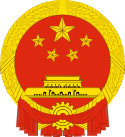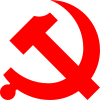- Central Committee of the Communist Party of China
-
People's Republic of China 
This article is part of the series:
Politics and government of
the People's Republic of ChinaIdeology- Leadership of China
- Constitutional history
- National Congress
- Central Committee
- Central Commission for Discipline Inspection
- Secretary: He Guoqiang
- National People's Congress
- NPC Standing Committee
- President: Hu Jintao
- State Council (Central People's Government)
- Premier: Wen Jiabao
- Vice Premiers
- 1st ranking: Li Keqiang
- State Councilors
- Vice Premiers
- Premier: Wen Jiabao
- PRC Central Military Commission
- Supreme People's Court
- President: Wang Shengjun
- Supreme People's Procuratorate
- Procurator-General: Cao Jianming
- Political Consultative Conference
- National Committee
- Minor political parties
Other issues
The Central Committee of the Communist Party of China (simplified Chinese: 中国共产党中央委员会; traditional Chinese: 中國共產黨中央委員會; pinyin: Zhōngguó Gòngchǎndǎng Zhōngyāng Wěiyuánhuì) is the highest authority within the Communist Party of China. Its approximately 350 members and alternates are selected once every five years by the National Party Congress.
The Central Committee appoints many of the most powerful people in China, including the General Secretary and the members of the Politburo, Standing Committee, and Central Military Commission.
The Secretariat of the Central Committee is the working body of the Politburo and its Standing Committee. Members of the Secretariat are nominated by the Standing Committee and are subject to endorsement by the Central Committee[1]. They include the Central Propaganda Department, the Central Organization Department, the Central International Liaison Department, and the United Front Work Department, among others.
Function and Structure
While the Central Committee does not exercise authority as a corporate body in the same way that a legislature would, it is an important body in that it contains the leading figures of the party, state, and army. In contrast to Party Congresses, which have always been ceremonial, full meetings of the Central Committee have been on occasion arenas in which there are real debates and decisions on party policy. An example of this was the Third Plenary Session of the 11th CPC Central Committee in 1978, at which China formally embarked on a project of Chinese economic reform. The Central Committee is larger and has a somewhat more diverse ideological spectrum than the Politburo.
Some analysts have suggested that as part of his effort to increase intra-party democracy that Hu Jintao intends to increase the power held by the Central Committee. Two significant acts taken by Hu have been the cancellation of the traditional August leadership conference at Beidaihe, and the comparative large amount of public coverage given to the plenary Central Committee meeting in October 2003.
References
External links
National Congress Central Committee Central Commission for Discipline Inspection General Secretary Central Military Commission Politburo Secretariat Politburo Standing Committee 
National Congress of the Communist Party of China 1st (1921) · 2nd (1922) · 3rd (1923) · 4th (1925) · 5th (1927) · 6th (1928) · 7th (1945) · 8th (1956) · 9th (1969) · 10th (1973) · 11th (1977) · 12th (1982) · 13th (1987) · 14th (1992) · 15th (1997) · 16th (2002) · 17th (2007) · 18th (2012)

Central Committee of the Communist Party of China Subunits General Secretary · Politburo · Politburo Standing Committee · Secretariat · Military Commission · Political and Legislative Affairs Committee · Propaganda Department · Organization Department · Central Party School
Sittings 1st (1921) vacant · 2nd (1922) · 3rd (1923) · 4th (1925) · 5th (1927) · 6th (1928) · 7th (1945) · 8th (1956) · 9th (1969) · 10th (1973) · 11th (1977) · 12th (1982) · 13th (1987) · 14th (1992) · 15th (1997) · 16th (2002) · 17th (2007) · 18th (2012)
Wikimedia Foundation. 2010.
